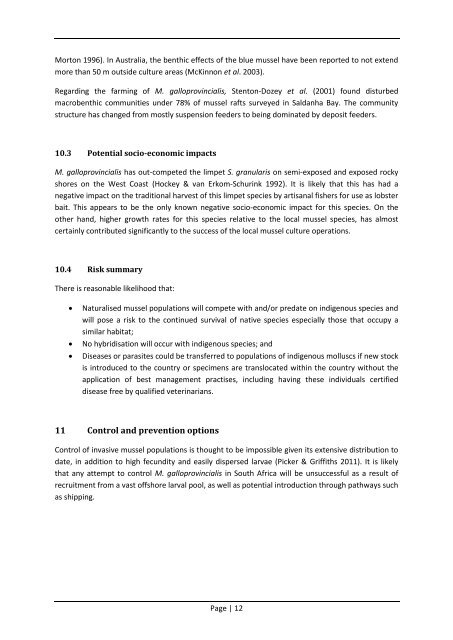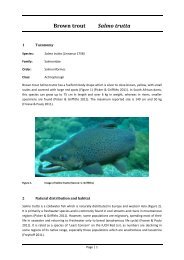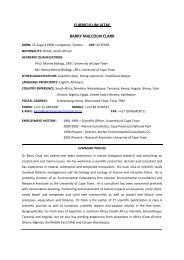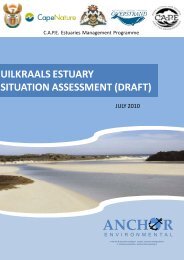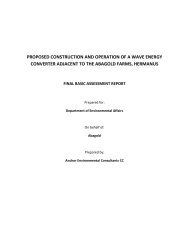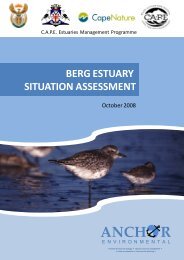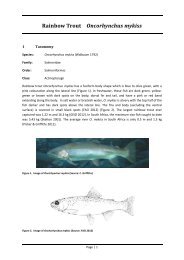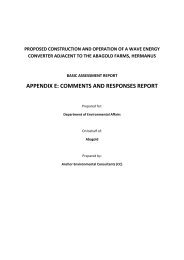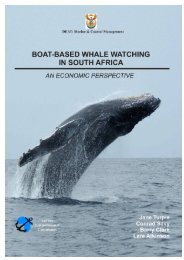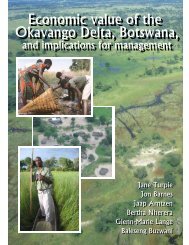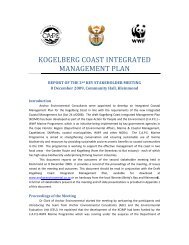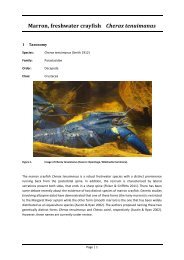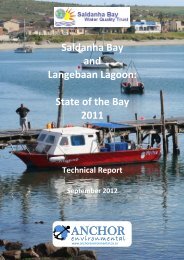Mediterranean mussel Mytilus galloprovincialis - Department of ...
Mediterranean mussel Mytilus galloprovincialis - Department of ...
Mediterranean mussel Mytilus galloprovincialis - Department of ...
You also want an ePaper? Increase the reach of your titles
YUMPU automatically turns print PDFs into web optimized ePapers that Google loves.
Morton 1996). In Australia, the benthic effects <strong>of</strong> the blue <strong>mussel</strong> have been reported to not extendmore than 50 m outside culture areas (McKinnon et al. 2003).Regarding the farming <strong>of</strong> M. <strong>galloprovincialis</strong>, Stenton-Dozey et al. (2001) found disturbedmacrobenthic communities under 78% <strong>of</strong> <strong>mussel</strong> rafts surveyed in Saldanha Bay. The communitystructure has changed from mostly suspension feeders to being dominated by deposit feeders.10.3 Potential socio-economic impactsM. <strong>galloprovincialis</strong> has out-competed the limpet S. granularis on semi-exposed and exposed rockyshores on the West Coast (Hockey & van Erkom-Schurink 1992). It is likely that this has had anegative impact on the traditional harvest <strong>of</strong> this limpet species by artisanal fishers for use as lobsterbait. This appears to be the only known negative socio-economic impact for this species. On theother hand, higher growth rates for this species relative to the local <strong>mussel</strong> species, has almostcertainly contributed significantly to the success <strong>of</strong> the local <strong>mussel</strong> culture operations.10.4 Risk summaryThere is reasonable likelihood that:Naturalised <strong>mussel</strong> populations will compete with and/or predate on indigenous species andwill pose a risk to the continued survival <strong>of</strong> native species especially those that occupy asimilar habitat;No hybridisation will occur with indigenous species; andDiseases or parasites could be transferred to populations <strong>of</strong> indigenous molluscs if new stockis introduced to the country or specimens are translocated within the country without theapplication <strong>of</strong> best management practises, including having these individuals certifieddisease free by qualified veterinarians.11 Control and prevention optionsControl <strong>of</strong> invasive <strong>mussel</strong> populations is thought to be impossible given its extensive distribution todate, in addition to high fecundity and easily dispersed larvae (Picker & Griffiths 2011). It is likelythat any attempt to control M. <strong>galloprovincialis</strong> in South Africa will be unsuccessful as a result <strong>of</strong>recruitment from a vast <strong>of</strong>fshore larval pool, as well as potential introduction through pathways suchas shipping.Page | 12


